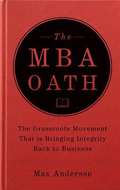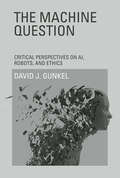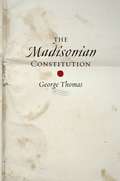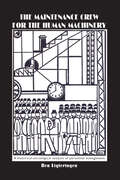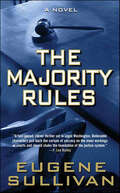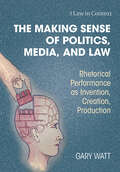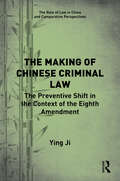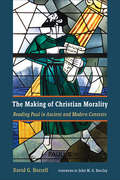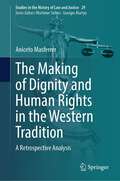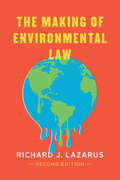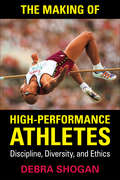- Table View
- List View
The Lucky Ones
by Jenny BrownJonathan Safran Foer meets Jeffrey Moussaieff Mason in a poignant, provocative memoir of survival, compassion, and awakening to the reality of our food system. Jenny Brown was ten years old when she lost a leg to bone cancer. Throughout the ordeal, her constant companion was a cat named Boogie. Years later, she would make the connection between her feline friend and the farm animals she ate, acknowledging that most of America's domesticated animals live on industrialized farms, and are viewed as mere production units. Raised in a conservative Southern Baptist family in Kentucky, Brown had been taught to avoid asking questions. But she found her passion and the courage to speak out. The Lucky Ones introduces readers to Woodstock Farm Animal Sanctuary which Brown established with her husband in 2004. With a cast of unforgettable survivors, including a fugitive slaughterhouse cow named Kayli; Albie, the three-legged goat; and Quincy, an Easter duckling found abandoned in New York City, The Lucky Ones reveals shocking statistics about the prevalence of animal abuse throughout America's agribusinesses. Blending wry humor with unflinching honesty, Brown brings a compelling new voice to the healthy-living movement--and to the vulnerable, voiceless creatures among us.
The Luke Garrison Series: The Disappearance, Above the Law, and A Killing in the Valley (The Luke Garrison Series)
by J. F. FreedmanThe New York Times–bestselling series featuring a renegade California legal eagle that&’s &“impossible to put down&” (Entertainment Weekly). Award-winning filmmaker and author of Against the Wind J. F. Freedman writes thrillers with &“plenty of twists and turns&” (Chicago Tribune). The Luke Garrison mysteries are &“compelling . . . taut, moving and wonderfully told&” (Robert B. Parker). The Disappearance: Luke Garrison was a celebrated Santa Barbara DA—until he mistakenly sent a man to the gas chamber. Now, when the daughter of a media tycoon is murdered and the city is crying out for blood, Garrison has the unenviable job of defending the accused. And with so many false leads, family secrets, and killer twists, Garrison&’s life and career are on trial too. Above the Law: In this New York Times bestseller, Luke Garrison must investigate a government cover-up. After a DEA raid ends in the death of a notorious drug overlord, defense attorney Garrison is persuaded by his old colleague Nora Ray to investigate. She&’s convinced that the murder of the vicious kingpin is not what it seems—but rather part of a greater conspiracy that&’s now drawing them into the line of fire. A Killing in the Valley: Maria Estrada, a hard-partying girl with family ties to some of the toughest gangsters in California, has been raped and murdered in the mansion of one the wealthiest landowners in the Santa Ynez Valley. Attorney Luke Garrison and PI Kate Blanchard must locate the elusive connection between the poverty where Maria was raised and the affluence of where she died.
The MBA Oath
by Peter Escher Max Anderson"As a manager, my purpose is to serve the greater good by bringing people and resources together to create value that no single individual can create alone..." So begins the MBA Oath, conceived in early 2009 by Max Anderson, Peter Escher, and a team of Harvard Business School students. They saw that in the wake of the financial crisis, the Madoff scandal, and other headlines, MBAs were being vilified. People were angry because business leaders, many of whom were MBAs, seemed not to care about anything beyond their own private interests. Many began to question the worth of business schools and the MBA degree. The oath quickly spread beyond Harvard, becoming a worldwide movement for a new generation of leaders who care about society as well as the bottom line. Thousands of graduating MBAs have now pledged to conduct themselves with honesty and integrity, just as medical students swear by the Hippocratic oath before they can practice. This book is the manifesto for the movement. It provides not only a strong case for why the MBA Oath is necessary but also examples of how it can be applied in the real world. It will help guide businesspeople through some of the toughest decisions they'll make in their careers.
The Machine Question: Critical Perspectives on AI, Robots, and Ethics (The\mit Press Ser.)
by David J. GunkelAn investigation into the assignment of moral responsibilities and rights to intelligent and autonomous machines of our own making.One of the enduring concerns of moral philosophy is deciding who or what is deserving of ethical consideration. Much recent attention has been devoted to the "animal question"—consideration of the moral status of nonhuman animals. In this book, David Gunkel takes up the "machine question": whether and to what extent intelligent and autonomous machines of our own making can be considered to have legitimate moral responsibilities and any legitimate claim to moral consideration.The machine question poses a fundamental challenge to moral thinking, questioning the traditional philosophical conceptualization of technology as a tool or instrument to be used by human agents. Gunkel begins by addressing the question of machine moral agency: whether a machine might be considered a legitimate moral agent that could be held responsible for decisions and actions. He then approaches the machine question from the other side, considering whether a machine might be a moral patient due legitimate moral consideration. Finally, Gunkel considers some recent innovations in moral philosophy and critical theory that complicate the machine question, deconstructing the binary agent–patient opposition itself.Technological advances may prompt us to wonder if the science fiction of computers and robots whose actions affect their human companions (think of HAL in 2001: A Space Odyssey) could become science fact. Gunkel's argument promises to influence future considerations of ethics, ourselves, and the other entities who inhabit this world.
The Madisonian Constitution
by George ThomasThis volume examines four crucial moments in the United States' political history--the Civil War and Reconstruction, the Progressive Era, Franklin Delano Roosevelt's presidency and the New Deal, and the Reagan revolution--to illustrate the Madisonian view that the present rise of judicial supremacy actually runs counter to the Constitution as established at the nation's founding.
The Madisonian Constitution (The Johns Hopkins Series in Constitutional Thought)
by George ThomasToday, we think of constitutional questions as being settled by the Supreme Court.But that is not always the case, nor is it what the framers intended in constructing the three-branch federal government. This volume examines four crucial moments in the United States' political history—the Civil War and Reconstruction, the Progressive Era, Franklin Delano Roosevelt's presidency and the New Deal, and the Reagan revolution—to illustrate the Madisonian view that the present rise of judicial supremacy actually runs counter to the Constitution as established at the nation’s founding.George Thomas opens by discussing how the Constitution encourages an antagonistic approach to settling disputes, thereby preserving itself as the nation's fundamental law rather then ceding that role to the president, Congress, or Supreme Court. In considering the four historical case studies, he focuses on judicial interpretations and the political branches' responses to them to demonstrate that competing conceptions of constitutional authority and meaning, as well as intergovernmental disputes themselves—rather than any specific outcome—strengthen the nature of the nation's founding document as a political instrument.Engagingly written and soundly argued, this study clarifies and highlights the political origins of the nation's foundational document and argues that American constitutionalism is primarily about countervailing power not legal limits enforced by courts.
The Magic of Rogues: Necromancers in Early Tudor England (Magic in History Sourcebooks #4)
by Frank Klaassen Sharon Hubbs WrightIn 1510, nine men were tried in the Archbishop’s Court in York for attempting to find and extract a treasure on the moor near Mixindale through necromantic magic. Two decades later, William Neville and his magician were arrested by Thomas Cromwell for having engaged in a treasonous combination of magic practices and prophecy surrounding the death of William’s older brother, Lord Latimer, and the king. In The Magic of Rogues, Frank Klaassen and Sharon Hubbs Wright present the legal documents about and open a window onto these fascinating investigations of magic practitioners in early Tudor England. Set side by side with sixteenth- and seventeenth-century texts that describe the sorts of magic those practitioners performed, these documents are translated, contextualized, and presented in language accessible to nonspecialist readers. Their analysis reveals how magicians and cunning folk operated in extended networks in which they exchanged knowledge, manuscripts, equipment, and even clients; foregrounds magicians’ encounters with authority in ways that separate them from traditional narratives about witchcraft and witch trials; and suggests that the regulation and punishment of magic in the Tudor period were comparatively and perhaps surprisingly gentle. Incorporating the study of both intellectual and legal sources, The Magic of Rogues presents a well-rounded picture of illicit learned magic in early Tudor England.Engaging and accessible, this book will appeal to anyone seeking to understand the intersection of medieval legal history, religion, magic, esotericism, and Tudor history.
The Magic of Rogues: Necromancers in Early Tudor England (Magic in History Sourcebooks)
by Frank Klaassen Sharon Hubbs WrightIn 1510, nine men were tried in the Archbishop’s Court in York for attempting to find and extract a treasure on the moor near Mixindale through necromantic magic. Two decades later, William Neville and his magician were arrested by Thomas Cromwell for having engaged in a treasonous combination of magic practices and prophecy surrounding the death of William’s older brother, Lord Latimer, and the king. In The Magic of Rogues, Frank Klaassen and Sharon Hubbs Wright present the legal documents about and open a window onto these fascinating investigations of magic practitioners in early Tudor England. Set side by side with sixteenth- and seventeenth-century texts that describe the sorts of magic those practitioners performed, these documents are translated, contextualized, and presented in language accessible to nonspecialist readers. Their analysis reveals how magicians and cunning folk operated in extended networks in which they exchanged knowledge, manuscripts, equipment, and even clients; foregrounds magicians’ encounters with authority in ways that separate them from traditional narratives about witchcraft and witch trials; and suggests that the regulation and punishment of magic in the Tudor period were comparatively and perhaps surprisingly gentle. Incorporating the study of both intellectual and legal sources, The Magic of Rogues presents a well-rounded picture of illicit learned magic in early Tudor England.Engaging and accessible, this book will appeal to anyone seeking to understand the intersection of medieval legal history, religion, magic, esotericism, and Tudor history.
The Magician
by Sol SteinA vicious high school fight leads to a terrifying miscarriage of justice in this &“superior&” legal thriller by the celebrated author: &“A spectacular read&” (The New York Times). For sixteen-year-old Ed Japhet, high school prom is a moment to shine. Performing a magic act for his classmates and teachers, Ed scares the wits out of them with feats that include the use of a trick guillotine. But while Ed&’s act pleases the crowd, it upsets a young hoodlum named Stanislaus Urek who doesn&’t like being made to look foolish. Catching up to Ed and his girlfriend in the parking lot, Urek beats Ed within an inch of his promising life. Everyone knows Urek should be behind bars. But while Ed survives the merciless attack, the fight has only begun. Urek&’s father hires a lawyer named Thomassy who knows a few tricks of his own. In a protracted legal battle, Thommasy discredits some witnesses and intimidates others until American justice looks like nothing but smoke and mirrors in this &“fast-moving, incisive&” thriller (Library Journal).
The Magnate's Mistress
by Miranda LeeHe wanted her as his mistress... but as the mother of his child?Tara was millionaire Australian hotel magnate Max Richmond's mistress. She loved Max for himself, not for the gifts he gave her, their glamorous life, or even their intense lovemaking. But now, she was expecting his baby, the question was, should she stay or should she go? Tara was convinced there was no place for a pregnant mistress in Max's life, or was there?
The Magnitude and Sources of Disagreement Among Gun Policy Experts, Second Edition
by Andrew R. Morral Terry L. Schell Rosanna SmartThis report describes combined results from two fieldings of a survey of gun policy experts. In particular, respondents estimated the likely effects of 19 gun policies on ten outcomes, such as firearm homicides and the right to bear arms. Researchers use the results to identify where experts agree and disagree the most and whether disagreements stem from assumptions about the effects of gun policies or from differences in policy objectives.
The Maintenance Crew for the Human Machinery (Pallas Proefschriften)
by Ben LigteringenThe book, written as a doctoral thesis, examines the development of the personnel function in labour organisations. Starting from a history of personnel management in the Netherlands during the second half of the 20th century, it analyses the structural transformation in the societal-economic environment from which originate far-reaching changes in employee relations. The transformation from the post-war model of guided capitalism towards its neo-liberal variety has serious consequences for intra-organisational power relations which result in a one-sided articulation of interests. This erodes the moral fabric of the labour organisation as a social institution. In this context special attention is paid to the wide-spread erosion of corporate ethics in the 21st century. The intensification of the labour process - a consistent phenomenon in industrial capitalism – has got a new impulse, due to the lack of countervailing power within an eroding system of labour relations as well as to superior production techniques and technologies. These tendencies have a deteriorating effect on the substance of the personnel discipline, ending up in a loss of function.
The Majesty of the Law
by Sandra Day O'ConnorIn this remarkable book, a national bestseller in hardcover, Sandra Day O'Connor explores the law, her life as a Supreme Court Justice, and how the Court has evolved and continues to function, grow, and change as an American institution. Tracing some of the origins of American law through history, people, ideas, and landmark cases, O'Connor sheds new light on the basics, exploring through personal observation the evolution of the Court and American democratic traditions. Straight-talking, clear-eyed, inspiring, The Majesty of the Law is more than a reflection on O'Connor's own experiences as the first female Justice of the Supreme Court; it also reveals some of the things she has learned and believes about American law and life--reflections gleaned over her years as one of the most powerful and inspiring women in American history.From the Trade Paperback edition.
The Majority Rules: A Novel
by Eugene SullivanPolitical connections had secured for Tim Quinn a seat on the appellate bench ... but in the court presided over by Chief Judge Harry Winston; Tim still had to learn The Majority RulesTim Quinn, a Washington DC lawyer on the move, was flattered to be recommended by his friend Harry Winston to a vacancy on the bench caused by the unsavory death of one of the judges. He was also surprised to see how easy his nomination and confirmation turned out to be once Harry had given his approval and pulled more than a few strings.Now Tim feels he has the chance to make a difference, and perhaps clear a path for an eventual trip to the highest court in the land. But Tim soon realizes that Chief Judge Winston's influence and favors come at a price-not just undue influence from the Executive branch, but partiality towards private concerns as well, including a certain attorney whose cases often come before their bench..Winston expects his favors to be repaid in kind, by following his judicial lead and assuring a consistent majority ruling in matters as he sees fit... and he is not afraid to bring pressure to bear, financial or otherwise.Troubled Tim contacts a former paramour, now a Federal prosecutor, to help him unravel the unseemly entanglements that occur behind the bench. But in doing so, risks his own status as a judge, his good name, and perhaps even the lives of him and his family-it is sometimes deadly to disagree when The Majority Rules.At the Publisher's request, this title is being sold without Digital Rights Management Software (DRM) applied.
The Makeover: Reality Television and Reflexive Audiences (Critical Cultural Communication #26)
by Katherine SenderThe first book to consider the rapid rise of makeover shows from the perspectives of their viewersWatch this show, buy this product, you can be a whole new you!Makeover television shows repeatedly promise self-renewal and the opportunity for reinvention, but what do we know about the people who watch them? As it turns out, surprisingly little.The Makeover is the first book to consider the rapid rise of makeover shows from the perspectives of their viewers. Katherine Sender argues that this genre of reality television continues a long history of self-improvement, shaped through contemporary media, technological, and economic contexts. Most people think that reality television viewers are ideological dupes and obliging consumers. Sender, however, finds that they have a much more nuanced and reflexive approach to the shows they watch. They are critical of the instruction, the consumer plugs, and the manipulative editing in the shows. At the same time, they buy into the shows’ imperative to construct a reflexive self: an inner self that can be seen as if from the outside, and must be explored and expressed to others. The Makeover intervenes in debates about both reality television and audience research, offering the concept of the reflexive self to move these debates forward.
The Making Sense of Politics, Media, and Law: Rhetorical Performance as Invention, Creation, Production (Law in Context)
by Gary WattFrom Trump's 'make America great again' to Johnson's 'build back better', performative politicians use The Making Sense to persuade their public audiences. Law 'makers' do it too: A courtroom trial is a 'truth factory' in which facts are not found but forged. The 'court of popular opinion' is another such factory, though its processes are often flawed and its products faulty. Where courts of law aim to make civil peace, 'trial by Twitter' makes civil strife. Even in 'mainstream' media, journalists make news for public consumption, so that all news is to an extent 'fake news'. In a world of making, how can we separate craft from craftiness? With insights from disciplines including law, politics, rhetoric, media studies, psychology, sociology, marketing, and performance studies, The Making Sense of Politics, Media, and Law offers a constructive way to approach controversies from transgender identity to cancel culture. This title is also available as open access on Cambridge Core.
The Making of Chinese Criminal Law: The Preventive Shift in the Context of the Eighth Amendment (The Rule of Law in China and Comparative Perspectives)
by Ying JiBy examining the reasons behind the preventive criminalization of Chinese criminal law, this book argues that the shift of criminal law generates popular expectations of legislative participation, and meets punitive demands of the public, but the expansion of criminal law lacks effective constraints, which will keep restricting people’s freedom in the future. The book is inspired by the eighth amendment of Chinese criminal law in 2011, which amended several penalties related to road, drug and environmental safety. It is on the eighth amendment that subsequent amendments have been based. The amendment stemmed from a series of nationally known incidents that triggered widespread public dissatisfaction with the Chinese criminal justice system. Based on John Kingdon’s theory of the multiple streams, the book explains the origins of the legislative process and its outcomes by examining the role of public opinion, policy experts and political actors in the making of Chinese criminal law. It argues that in authoritarian China, the prominence of risk control through criminal justice methods is a state response to uncertainties generated through reforms under the CCP’s leadership. The process of criminal lawmaking has become more responsive and inclusive than ever before, even though it remains a consultation with the elites within the framework set by the Chinese Communist Party (CCP), including representatives of the Lianghui, government ministries, academics and others. The process enhances the CCP’s legitimacy by not only generating popular expectations of legislative participation, but also by meeting the punitive demands of the public. The book will be of interest to academics and researchers in the areas of Chinese criminal law and comparative law.
The Making of Christian Morality: Reading Paul in Ancient and Modern Contexts
by David G. Horrell John M. BarclayIn this volume David Horrell focuses on themes of community, ethics, and ecology in Paul, moving from the concrete social circumstances in which the earliest Christian communities gathered to the appropriation of Paul’s writings in relation to modern ethical challenges. Often questioning established consensus positions, Horrell opens up new perspectives and engages with ongoing debates both in Pauline studies and in contemporary ethics.After covering historical questions about the setting of the Paul-ine communities, The Making of Christian Morality analyzes Paul-ine ethics through a detailed study of particular passages. In the third and final section Horrell brings Pauline thought to bear on contemporary issues and challenges, using the environmental crisis as a case study to demonstrate how Paul’s ethics can be appropriated fruitfully in a world so different from Paul’s own.
The Making of Christian Morality: Reading Paul in Ancient and Modern Contexts
by David G. HorrellIn this volume David Horrell focuses on themes of community, ethics, and ecology in Paul, moving from the concrete social circumstances in which the earliest Christian communities gathered to the appropriation of Paul&’s writings in relation to modern ethical challenges. Often questioning established consensus positions, Horrell opens up new perspectives and engages with ongoing debates both in Pauline studies and in contemporary ethics.After covering historical questions about the setting of the Paul-ine communities, The Making of Christian Morality analyzes Paul-ine ethics through a detailed study of particular passages. In the third and final section Horrell brings Pauline thought to bear on contemporary issues and challenges, using the environmental crisis as a case study to demonstrate how Paul&’s ethics can be appropriated fruitfully in a world so different from Paul&’s own.
The Making of Dignity and Human Rights in the Western Tradition: A Retrospective Analysis (Studies in the History of Law and Justice #29)
by Aniceto MasferrerThe book describes in a retrospective way how dignity and human rights evolved. In doing so, the book is divided in three parts: human rights from present to early modern age, human dignity from present to Early modern age and dignity and human rights from present to future.The book has been written in a way that might me appealing to graduate students, postgraduate students, researchers and even laymen who are interested in the making of dignity and human rights in the Western.
The Making of Environmental Law
by Richard J. LazarusAn updated and passionate second edition of a foundational book. How did environmental law first emerge in the United States? Why has it evolved in the ways that it has? And what are the unique challenges inherent to environmental lawmaking in general and in the United States in particular? Since its first edition, The Making of Environmental Law has been foundational to our understanding of these questions. For the second edition, Richard J. Lazarus returns to his landmark book and takes stock of developments over the last two decades. Drawing on many years of experience on the frontlines of legal and policy battles, Lazarus provides a theoretical overview of the challenges that environmental protection poses for lawmaking, related to both the distinctive features of US lawmaking institutions and the spatial and temporal dimensions of ecological change. The book explains why environmental law emerged in the manner and form that it did in the 1970s and traces how it developed over sequent decades through key laws and controversies. New chapters, composing more than half of the second edition, examine a host of recent developments. These include how Congress dropped out of environmental lawmaking in the early twenty-first century; the shifting role of the judiciary; long-overdue efforts to provide environmental justice to disadvantaged communities; and the destabilization of environmental law that has resulted from the election of Presidents with dramatically clashing environmental policies. As the nation’s partisan divide has grown deeper and the challenge of climate change has dramatically raised the perceived stakes for opposing interests, environmental law is facing its greatest challenges yet. This book is essential reading for understanding where we have been and what challenges and opportunities lie ahead.
The Making of Environmental Law
by Richard J. LazarusAn updated and passionate second edition of a foundational book. How did environmental law first emerge in the United States? Why has it evolved in the ways that it has? And what are the unique challenges inherent to environmental lawmaking in general and in the United States in particular? Since its first edition, The Making of Environmental Law has been foundational to our understanding of these questions. For the second edition, Richard J. Lazarus returns to his landmark book and takes stock of developments over the last two decades. Drawing on many years of experience on the frontlines of legal and policy battles, Lazarus provides a theoretical overview of the challenges that environmental protection poses for lawmaking, related to both the distinctive features of US lawmaking institutions and the spatial and temporal dimensions of ecological change. The book explains why environmental law emerged in the manner and form that it did in the 1970s and traces how it developed over sequent decades through key laws and controversies. New chapters, composing more than half of the second edition, examine a host of recent developments. These include how Congress dropped out of environmental lawmaking in the early twenty-first century; the shifting role of the judiciary; long-overdue efforts to provide environmental justice to disadvantaged communities; and the destabilization of environmental law that has resulted from the election of Presidents with dramatically clashing environmental policies. As the nation’s partisan divide has grown deeper and the challenge of climate change has dramatically raised the perceived stakes for opposing interests, environmental law is facing its greatest challenges yet. This book is essential reading for understanding where we have been and what challenges and opportunities lie ahead.
The Making of Environmental Law
by Richard J. LazarusAn updated and passionate second edition of a foundational book. How did environmental law first emerge in the United States? Why has it evolved in the ways that it has? And what are the unique challenges inherent to environmental lawmaking in general and in the United States in particular? Since its first edition, The Making of Environmental Law has been foundational to our understanding of these questions. For the second edition, Richard J. Lazarus returns to his landmark book and takes stock of developments over the last two decades. Drawing on many years of experience on the frontlines of legal and policy battles, Lazarus provides a theoretical overview of the challenges that environmental protection poses for lawmaking, related to both the distinctive features of US lawmaking institutions and the spatial and temporal dimensions of ecological change. The book explains why environmental law emerged in the manner and form that it did in the 1970s and traces how it developed over sequent decades through key laws and controversies. New chapters, composing more than half of the second edition, examine a host of recent developments. These include how Congress dropped out of environmental lawmaking in the early twenty-first century; the shifting role of the judiciary; long-overdue efforts to provide environmental justice to disadvantaged communities; and the destabilization of environmental law that has resulted from the election of Presidents with dramatically clashing environmental policies. As the nation’s partisan divide has grown deeper and the challenge of climate change has dramatically raised the perceived stakes for opposing interests, environmental law is facing its greatest challenges yet. This book is essential reading for understanding where we have been and what challenges and opportunities lie ahead.
The Making of High Performance Athletes
by Debra ShoganHighly skilled athletes are produced by technologies of training which seek to create the athlete as a singular identity. Yet the disciplinary model of modern sport is consistently disrupted by the diversity and hybridity of the participants. Using Foucault's work on disciplinary power as a theoretical framework, Debra Shogan, an academic in sports ethics and a coach of high performance athletes, examines the ways in which athletes are produced through technologies of training and the ethical issues which emerge when demands to improve performance envelopes athletes, coaches, administrators and sports scientists in decisions about how far to push the limits of performance. Making the case for a new, postmodern sports ethic, Shogan shows how the juxtaposition of hybrid athletes with the homogenizing technologies of sport discipline opens up spaces for questioning, refusing, and perhaps creating new ways of participating in sport.
The Making of Humanity
by Robert BriffaultExplore the profound forces and pivotal events that have shaped human civilization with Robert Briffault's The Making of Humanity. This thought-provoking and comprehensive work delves into the cultural, intellectual, and social developments that have defined the human experience, offering readers an insightful and engaging narrative of humanity's journey through history.Robert Briffault, a distinguished historian, anthropologist, and sociologist, meticulously examines the factors that have contributed to the development of human society. In The Making of Humanity, Briffault presents a sweeping analysis of the evolution of human culture, tracing the origins and growth of key concepts such as science, art, religion, and social organization.Briffault's work stands out for its interdisciplinary approach, drawing on evidence from a wide range of fields including history, anthropology, sociology, and philosophy. His narrative covers significant milestones in human development, from the dawn of civilization and the rise of ancient cultures to the transformative impacts of the Renaissance, the Enlightenment, and the Industrial Revolution.The Making of Humanity explores the intellectual revolutions that have propelled humanity forward, highlighting the contributions of great thinkers, inventors, and artists who have shaped the course of history. Briffault also addresses the complex interplay between human progress and the social and environmental challenges that have arisen along the way.Join Robert Briffault as he unravels the story of humanity's ascent, examining the triumphs and trials that have defined our species. The Making of Humanity is a timeless exploration of the human condition, offering readers a deeper appreciation of the cultural and intellectual legacy that continues to shape our world.


